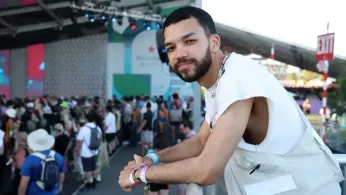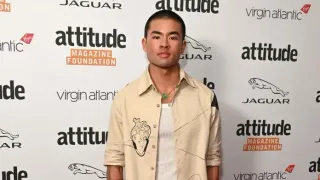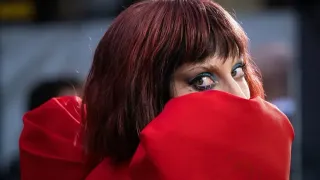
5 hours ago
Justice Smith Sets the Record Queer: Why Only We Get to Name Ourselves
READ TIME: 3 MIN.
Justice Smith is no stranger to the spotlight, but it’s not just his on-screen roles in “I Saw the TV Glow,” “Detective Pikachu,” or “Jurassic World: Fallen Kingdom” that have LGBTQ+ fans talking. The 29-year-old actor recently appeared on the viral TikTok show “Gaydar,” hosted by actor and drag queen Anania, and delivered a masterclass in queer autonomy and self-definition—one that’s already making waves in our community and beyond .
The moment that sent TikTok’s queer corners buzzing arrived in the show’s signature wrap-up, when Anania posed: “If I had to guess if you were gay, straight, or a homophobe…” Instead of playing along, Smith flipped the script. “I don’t allow straight people to call me gay,” he declared, his delivery both playful and razor-sharp. For Smith, it’s not just about semantics—it’s about who gets to tell our stories and define our truths .
Smith elaborated, “I think straight people have a limited definition of what gay is.” He described a familiar scenario: when he mentions a former girlfriend, straight friends are quick to exclaim, “But I thought you were gay!” His response? “You’re boring, and you’re basic.” It’s a quip that lands with the kind of knowing wink only queer folks can truly appreciate—a mix of frustration and fabulousness, a reminder that our lives don’t fit in neat boxes .
Smith’s resistance to the “gay” label—especially when wielded by those outside the community—speaks to broader conversations happening across queer spaces. “Even gay people sometimes struggle to grasp that attraction can extend beyond a single gender,” Smith noted, highlighting how even within LGBTQ+ culture, old binaries and assumptions can linger .
His openness about dating across genders and his public romance with boyfriend Nic Ashe—memorably immortalized in a 2022 Calvin Klein campaign—illustrate a lived experience that resists tidy categorization. Smith’s perspective isn’t just personal; it mirrors a generational shift toward embracing the full spectrum of queerness, where labels are tools for understanding, not cages for restriction. For many young queer people, Smith’s stance is both vindication and invitation: come as you are, and let no one—especially not a straight person—tell you who that is .
Smith’s thoughts on queer identity are grounded in practice as much as theory. On “Gaydar,” he described the set of “I Saw the TV Glow” as a haven of LGBTQ+ creativity: “Everything was gay,” he said with a laugh, adding that the cast and crew included “trans folk, nonbinary folk” and all the radiant diversity queer cinema now offers .
It’s no accident that Smith, who trained at the Orange County School of the Arts and broke out in Netflix’s “The Get Down,” has become a touchstone for contemporary queer representation. His work—on and off the screen—channels the energy of a generation pushing against limits, insisting that identity isn’t something to be policed by the mainstream, but lived and celebrated in all its messy, gorgeous complexity .
Smith’s viral moment isn’t just about one actor’s preference—it’s about a long history of queer people fighting to claim our own narratives. Too often, straight definitions have been used to flatten, erase, or exoticize queer lives. When Smith says, “I don’t allow straight people to call me gay,” he’s not gatekeeping; he’s demanding respect for the complexity, nuance, and autonomy that queer people have always embodied .
For LGBTQ+ audiences, especially those navigating their own evolving identities, Smith’s words are a rallying cry: let’s be the authors of our own stories, the architects of our own language. And if someone can’t keep up? As Smith puts it: “You’re boring, and you’re basic.” There’s a whole queer world out here—alive, unlabelled, and unapologetic.
Justice Smith’s appearance on “Gaydar” is more than a viral soundbite—it’s a celebration of queer possibility, a challenge to anyone who tries to box us in, and a reminder that our voices matter. As the community continues to fight for representation, dignity, and joy, Smith’s candor offers a north star: only we can define ourselves, and that’s our superpower.
So, LGBTQ+ readers: claim your story, reject the basic, and let your queerness glow—just like Justice.






